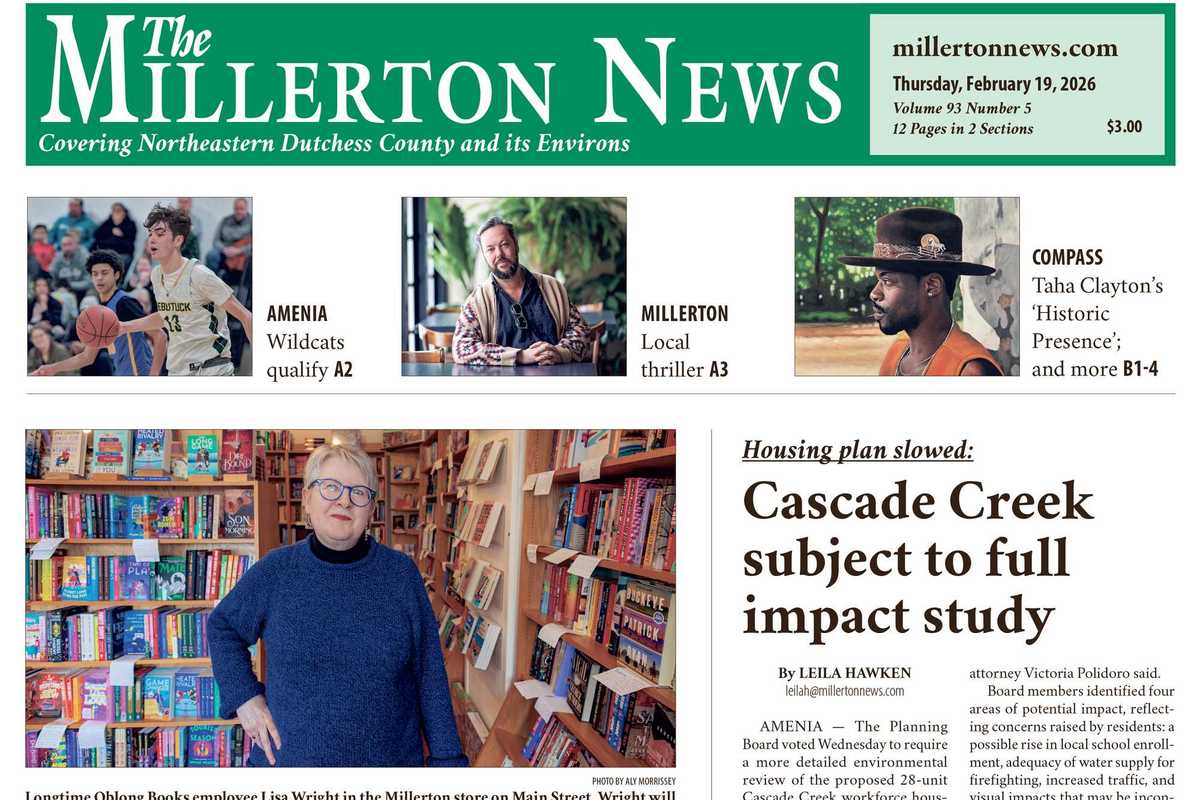Latest News
Local filmmaker debuts indie horror film at Millerton’s Moviehouse
Aly Morrissey
Feb 18, 2026
Keith Boynton
Photo by Aly Morrissey
MILLERTON — Local writer and filmmaker Keith Boynton premiered his indie slasher film “The Haunted Forest” on Friday the 13th at the Millerton Moviehouse in front of a hometown crowd, marking the movie’s first public screening — the same day it debuted on Amazon Prime Video and other platforms.
With a body of work spanning decades in drama and comedy — including “The Winter House,” starring Lily Taylor — this is Boynton’s first foray into the horror genre.
“As a filmmaker, I’m always thinking about what I can accomplish with the resources I have, what excites me, and what’s marketable to audiences,” Boynton, 44, said. “I go through phases where I think I’ve found ‘my genre,’ and then I move on.” He added that “The Haunted Forest” is his first horror film — an intentional choice because there is a market for it and enough overlap with his own interests.
Written and directed by Boynton, the film was primarily shot at a haunted attraction in Maryland in 2023 over a period of 18 days. The film follows a teen who takes a job as a scare actor at a haunted theme park — until “fake” scares turn deadly and bodies begin to pile up.
Boynton credits his brother Devin McEwan with the idea for the film. The pair worked on the outline together, and McEwan’s feedback shaped the story, Boynton said.
“I wrote a first draft that was just not ready for prime time because I didn’t understand the genre well enough,” he said. McEwan recommended a longer climax and more on-screen deaths to better fit the genre.
Although “The Haunted Forest” leans into familiar horror tropes, Boynton said he does not see the genre as the driving force behind his work. “I’ve been thinking a lot about genre, and I think the purest approach is not to care about genre at all,” he said. “I want to make movies that feel like movies.” He said some of the best movies change genres halfway through, including one of his favorites, Fight Club. “It changes genre and tone, but always feels like the same movie,” he said.
Boynton said his local upbringing and theater experience at Hotchkiss shaped his creative path and influenced his decision to shoot many of his projects in the Hudson Valley.
Boynton said he has been writing since before he could actually write. Though he is too young to remember, his parents said he wrote a poem at age two and never stopped.
“I’ve always liked language,” Boynton said. “I’ve always liked playing around with words, so I think I’ve been some kind of writer for, let’s call it, 40-something years now.”
By age 13, Boynton found himself bored at his grandfather’s house in the era before smartphones and the internet, when he stumbled upon a paperback compendium of film critic Roger Ebert’s movie reviews.
Captivated by Ebert’s passion for cinema, Boynton said he was hooked.
“At first I thought I wanted to be a critic, too,” he said. “But eventually I realized critics are outside the party looking in, and I wanted to be inside the party making the movies.”
The fascination grew into a decades-long tradition of attending the Sundance Film Festival, beginning at age 17 and continuing through this year’s final festival in Park City, Utah. Sundance organizers have announced the festival will move to Boulder, Colorado, beginning in 2027.
But for Boynton, who consumed as many films as possible at Sundance for nearly three decades, one memory will stay with him for the rest of his life. It was the moment he stood next to his idol Roger Ebert at a Park City urinal.
“I did not have the courage to talk to him,” Boynton laughed. “It’s not the right venue to tell someone, ‘You changed my life.’”
“The Haunted Forest” is available for purchase or rental on Amazon and other streaming platforms.
Keep ReadingShow less
Former church building approved for multimedia academy
Nathan Miller
Feb 18, 2026
The former Presbyterian church on Main Street in Millerton will soon become the second location of Caffeine Academy, a multimedia education center originally founded in West Babylon, New York.
Photo by Nathan Miller
MILLERTON — The long-vacant Presbyterian church on Main Street is poised for a new life after the Millerton Planning Board granted approval to a new education business Wednesday, Feb. 11.
Caffeine Academy, founded by Alex That in West Babylon, New York, plans to transform the prominent building into a center for multimedia production training, offering instruction in digital music, video production and related arts.
That sought site plan approval to renovate the building and bring it into compliance with current accessibility standards.
The next phase for That is to obtain building permits from Ken McLoughlin in the village’s building department and begin construction. That said he expects to make changes over the course of 2026, with a targeted opening for the business in 2027.
That’s Caffeine Academy — which he runs with assistance from his sons — began in 2013 as a school for DJing and music production that grew to accommodate and cater to people with special needs and abilities. Now, Caffeine Academy offers classes for all abilities in video production and multimedia arts in addition to the digital music classes.
The application passed with little discussion. That previously appeared in front of the Planning Board in December, but delayed the application to wait for a local law to go into effect that waived increased parking requirements for changes of use in Millerton’s commercial district. The law allowed the application to avoid seeking a variance from the Zoning Board of Appeals.
Keep ReadingShow less
Be my Valentine
Leila Hawken
Feb 18, 2026
Photo by Leila Hawken
Ashlyn Price, 7, designs a festive Valentine’s crown with sticky hearts and pipe cleaners during a craft session at Amenia Town Hall on Saturday, Feb. 14. Children and parents created red-and-pink heart headpieces and other holiday crafts at the event, organized by the Amenia Recreation Commission. Recreation Leader Cassidy Howard said she was pleased with both the turnout and the enthusiasm.

Want more of our stories on Google? Click here to make us a Preferred Source.
Webutuck varsity boys qualify for sectionals for the first time in a decade
Nathan Miller
Feb 18, 2026
Webutuck senior Evan Bremmer, center left, fights through Ellenville defenders to catch a pass during a home game on Friday, Feb. 13.
Photo by Nathan Miller
AMENIA — The Webutuck boys varsity basketball team qualified for the Section IX Invitational this year for the first time in over a decade.
Varsity head coach Shawn Howard said the school hasn’t been represented at the sectional tournament in the nine years he’s coached basketball at the school.
He and varsity starters Evan Bremmer, James Singleton and Zach Hood credited the team’s success this season to long relationships on the court.

“Most of the seniors this year, I started coaching them when they were in JV,” Howard said. “They’re used to my system and they put it together this year.”
Singleton, Bremmer and Hood have all played together since middle school when they competed on Webutuck’s modified league team. They said they can communicate with each other without talking.
“You don’t even have to tell each other, you can just see on each other’s faces,” Bremmer said. “And it makes the game so much easier, when you know how teammates play and what they want to do.”
Howard said that cohesion steadily improved over the years and ultimately carried the team into sectionals.
The team maintained a 5-3 record within the Mid-Hudson Athletic League, with a 5-8 record overall for the season after a hard-fought game ended in a 60-48 loss to Ellenville High School on Friday, Feb. 13. Teams have to win at least half of their league games to qualify for the sectional tournaments at the end of the season.
“The biggest thing is playing as a team,” Howard said.
Keep ReadingShow less
Kathleen Rosier
Millerton News
Feb 18, 2026
CANAAN — Kathleen Rosier, 92, of Ashley Falls Massachusetts, passed away peacefully with her children at her bedside on Feb. 5, at Fairview Commons Nursing Home in Great Barrington, Massachusetts.
Kathleen was born on Oct. 31,1933, in East Canaan to Carlton and Carrie Nott.
Kathleen retired from Housatonic Curtain Company where she was a machine operator for many years.
She was predeceased by her husband of 65 years, John A.Rosier Sr., her son John A Rosier Jr., her son Frank H. Rosier and her brother Jerome Nott.
Kathleen leaves behind her son, Brian Rosier and his wife JoEllen of East Canaan, her daughter, Theresa Morin of Ashley Falls, her daughter, Lisa Dawson of Great Barrington, a brother Henry Nott, her sister Ann Percy, 11 grandchildren, nine great grandchildren and many nieces, nephews and friends.
There will be a celebration of life held in her honor on Feb. 21 from 1 to 4 p.m. at the Bitterman Center in North Canaan. All are welcome to come.
Keep ReadingShow less
Ronald Ray Dirck
Millerton News
Feb 18, 2026
SHARON — Ronald Ray Dirck, affectionately known as Ron, passed away peacefully with his family at his side on Jan. 17, 2026, in Phoenix, Arizona, at the age of 85. Born on Jan. 31, 1940, in Sedalia, Missouri, Ron lived a life filled with warmth, laughter, and deep devotion to his family.
Ron shared an extraordinary 62-year marriage with his high school sweetheart and beloved wife, Jackie. Their enduring partnership was a shining example of living life to the fullest.
Ron served his country as a captain in the US Marine Corps, flying helicopters during the Vietnam War. He then flew commercially for TWA for 25 years, both domestically and internationally. He finished his flying career with Nippon Cargo Airlines. Ron enjoyed the outdoors and enjoyed taking care of their beloved Sharon, home for more than 50 years. He was also an avid builder and enjoyed his many projects over the years.
In retirement, Ron and Jackie split time between Sharon, and Phoenix, Arizona, before settling full-time in Phoenix two years ago. Ron loved his evening cocktails with Jackie and their many friends, as well as a hand or two of gin rummy.
He was a devoted father to Melissa Dirck Appel and her husband, Jeff Appel, and Patrick Dirck and his wife, Lisa Dirck. He carried the memory of his son Kevin with enduring love throughout his life. His legacy continues through his cherished grandchildren; Alexandra, Caroline, Emma, Natalie, Evan, Cooper, Elle, and Tanner. Ron is also fondly remembered by his brother, Jim and wife Lena.
Ron had a tender heart for animals. The loyal companionship of his beloved dogs Mini and Mae brought him comfort and joy over the years.
He was preceded in death by his wife, Jackie, and parents, Raymond and Gladys Dirck.
In honor of Ron’s love of animals, the family asks that, in lieu of flowers, donations be made to The Aussie and Friends Rescue, www.aussiefriendsrescue.com.
His light lives on in the hearts of all who knew him. May his memory continue to bring comfort and smiles to those he touched.
A private celebration of life for the family will be held at a later date.
Keep ReadingShow less

Want more of our stories on Google? Click here to make us a Preferred Source.
loading
























Public debate on North East’s zoning rewrite to continue March 20